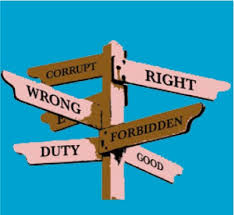记忆方法
将“morality”分解为“moral”和“-ity”。首先记住“moral”表示道德、品行,然后想象“-ity”是一个表示性质或状态的词缀。将这两个部分结合起来,想象道德如同一种持续存在并影响人的行为和品行的状态,这样可以帮助记忆“morality”表示道德或道德标准。
以上内容由AI生成, 仅供参考和借鉴
中文词源
morality 道德,准则
来自moral,道德的,-ity,名词后缀。引申词义道德,准则。
英语词源
- morality (n.)
- late 14c., "moral qualities," from Old French moralité "moral (of a story); moral instruction; morals, moral character" (13c.) and directly from Late Latin moralitatem (nominative moralitas) "manner, character," from Latin moralis (see moral (adj.)). Meaning "goodness" is attested from 1590s.
Where there is no free agency, there can be no morality. Where there is no temptation, there can be little claim to virtue. Where the routine is rigorously proscribed by law, the law, and not the man, must have the credit of the conduct. [William H. Prescott, "History of the Conquest of Peru," 1847]
权威例句
- 1. War turns morality inside out: killing and cruelty are virtues.
- 战争颠倒是非:杀戮与残忍成了美德。
- 2. Can all our efforts towards morality prevail over the forces of evil?
- 我们为提倡伦理道德所做的努力能够战胜邪恶的力量 吗 ?
- 3. He has overthrown the basic standards of morality.
- 他已摒弃了基本的道德标准.
- 4. Jacelin is a person of strict morality.
- 杰斯林是个品行极其端正的人.
- 5. Law and morality are the bulwark of society.
- 法律和道德是社会的防御工具.
